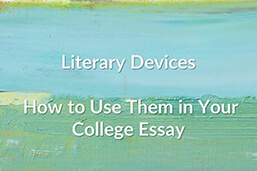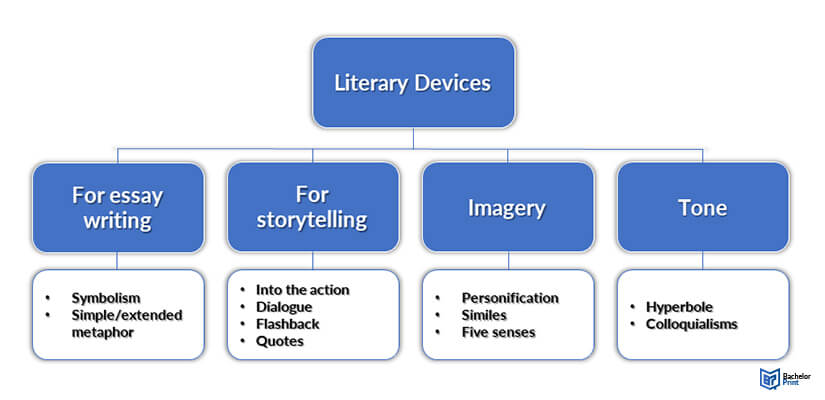
One of the best ways to make your college essay and other academic writing assignments interesting is by using literary devices. They serve as essential tools that authors employ to enrich their narratives, engage readers, and convey complex thoughts and emotions in an accessible way. This article will explore what literary devices are, why they’re important, and the most common literary devices you can use to make your academic essays more interesting.
Definition: Literary devices
Literary devices are tools or techniques writers use to make their narrations more captivating and hint at bigger meanings than what’s on paper. While some literary devices are only used on a sentence level, others transform the entire story. Most skilled writers use several literary devices to create a more powerful and memorable story.
Some common types of literary devices include:
- Figurative language – metaphors and similes create images and comparisons for better understanding.
- Sound devices – alliteration and onomatopoeia contribute to the rhythm, mood, and emphasis of the text.
- Narrative devices – foreshadowing and flashbacks affect the structure of the story and how it’s told.
- Stylistic devices – repetition and irony shape the overall voice, tone, and mood of the work.
In sum, literary devices enhance a piece of writing by making it more effective, memorable, and engaging in conveying its ideas and themes.

Literary devices for essays
The following are some of the best literary devices for essay writing and how to use them:
Symbolism
This refers to using an object, person, place, or subject to represent a broader concept or idea.
Extended metaphor
A metaphor is a figure of speech that compares two, unlike things without using the words “like” or “as.”
On the other hand, an extended metaphor is a metaphor that continues the comparison across multiple sentences or paragraphs in the same piece of writing.
Dos
- Choose the third metaphor you think of
- Use a comprehensive comparison
- Look for extended metaphors
- Always keep it subtle
Don’ts
- Don’t overuse extended metaphors
- Don’t use clichés
- Don’t use distracting metaphors
- Don’t use weakening metaphors
Literary devices for storytelling
The following are some literary devices that work best with storytelling:
Into the action
“In medias res” is a Latin word that means “in the midst of things.” This writing style places the reader in the middle of the action or scene without providing any contextual information.
Beginning your story in the middle of the action helps immerse the reader into your story from the start. It makes them ask a lot of questions regarding the characters in the opening scene and what’s the reason behind the events that are unfolding.
Dialogue
Writers often use dialogue to show communication between two characters in the story.
You can use dialogue in your college essay to move your story forward, show different points of view, or engage the reader with your story at an emotional level.
Flashback
A flashback is a sudden interruption in the story’s narration that brings the reader to an earlier event to provide context or backstory of the present event.
You can use flashbacks in your essay to arm the reader with some important information about a character’s backstory that they might not have known.
Quotes
Using a famous quote in your college essay provides the reader with more context of the topic you’re writing about and helps strengthen your argument.
Literary devices: Imagery
Writers use imagery to engage the human senses or create a picture in the reader’s mind. The following are some of the literary devices used to create imagery:
Personification
This is a writing technique used to give human characteristics to non-humans. When used in essays, personification allows the reader to relate easily to the object the writer is talking about.
Similes
Similes compare two objects using the words “like” or “as.” Using similes in your college essay can help make it more interesting and descriptive.
Five senses
This writing technique describes a particular object’s taste, smell, touch, sight, and sound. Using the five senses in your essay helps immerse the reader in your story by creating vivid images in their mind.
Literary devices: Tone
The tone is the mood or atmosphere the writer’s words paint to the reader. The following are the literary devices used to portray the writer’s tone:
Hyperbole
The hyperbole is using exaggeration to add more impact to a certain statement.
Colloquialisms
This refers to using informal phrases in a piece of writing.
Sentence-integrated literary devices
The following are the most commonly used sentence-integrated literary devices:
| Sentence-integrated literary devices | Definition | Example |
| Alliteration | This is using words that start with the same letter of the alphabet or sound in quick succession. | Mathew Murdock murdered the mad man. |
| Asyndeton | This refers to the intentional omission of a conjunction between two phrases or parts of a sentence. | You came, you lost. |
| Polysyndeton | This refers to using conjunctions in quick succession without commas or other punctuation marks. | We have stacks of cash and private planes and exotic cars. |
| Oxymoron | This refers to using contradictory terms in quick succession. | Virtual reality is taking over. |
| Amplification | This is the act of elaborating a simple sentence using many details to emphasize its importance. | A rich person can never be unattractive. You can be short, have long feet, and have no morals, but if you have money, people will still find you attractive. |
numerous advantages for Canadian students:
- ✓ 3D live preview of your configuration
- ✓ Free express delivery for every order
- ✓ High-quality bindings with individual embossing

FAQs
Literary devices are used to make pieces of writings more interesting to read.
You can use as many literary devices as you want, as long as they make sense and add something to the reader’s experience.
There are no restrictions when it comes to using literary devices.
You can use literary devices with all forms of formal and informal writing, including college essays, book reports, research papers, emails, and even text messages.
